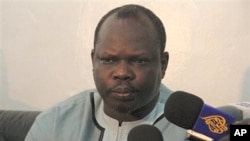South Sudan is reporting progress on issues that remain to be resolved with the northern Khartoum government.
North and south Sudan have been negotiating for months on how to make their divorce a smooth one. Just two weeks after final results from the south’s referendum were announced, they are nearing agreements on how to handle the south’s oil and currency after separation.
Since the 2005 peace deal that ended two decades of civil war in Sudan, the two sides have evenly split oil revenues.
The southern ruling party's secretary general, Pagan Amum, said that arrangement will end when the south becomes independent.
"The notion of continuing sharing wealth will not be there," he said. "There is no continuation, whether 50 percent or anything."
About 80 percent of the almost 500,000 barrels of oil a day produced in Sudan are found in the south. After separation, the south will pay the north to use its pipelines and send oil through its territory. The pipeline from southern oilfields runs through the north to the Port of Sudan.
For at least the next few years, the pipeline will be the only way for the south to export its oil, according to Amum.
"Southern Sudan will continue to export its oil through the north and it will pay fees, either transit fees or transport fees for the pipeline," said Amum.
Amum added that the north may come to the south to ask for a grant to offset the loss of oil revenue, something the south would be willing to pay.
The south has also decided to adopt a new currency after separation and will call it the pound. Amum added that the Central Bank of Sudan has agreed to buy back Sudanese pounds from the Bank of Southern Sudan after separation, one of the many potential points of conflict remaining before north and south.
The two major remaining hurdles in the negotiations are the future of the oil-rich Abyei region and border demarcation, according to Amum.
Residents of Abyei were supposed to vote along with southerners on January 9 to decide whether to remain a part of the north or join an independent south. The vote was delayed because of disagreements over who has the right to vote. It has been the most contentious issue since negotiations began and neither side has shown any willingness to compromise.
Work on border demarcation is scheduled to resume this weekend. Eighty percent of the border between north and south is complete, while the rest remains disputed. The south will refer to maps and documents produced 50 years ago under colonial rule, in an effort to reclaim from the north what they consider stolen land.
These issues will need to be resolved before the south becomes independent on July 9.
South Sudan Reports Progress on Seperation Issues




